Week 03 - Ethics in Social Work Research
A presentation at Heritage University at CBC Week 03 in in Pasco, WA 99301, USA by Jacob Campbell

SOWK 486 Fall 2019 Planning: Class 03
Location: CBC Campus - Tuesday T-336 & SWL-220
Time: Tuesdays and Thursdays from 5:30-8:15
Week 03: 09/02/19 — 09/08/19
Reading Assignment: DeCarlo (2018) chapter five
Topic and Content Area: Peer Review: Introductions; Research and Ethics
Assignments Due: Assignment 04: peer review introduction due Friday 09/06/19 at 11:55 PM via Moodle; Assignment 02: reading quiz for chapter five is due at 5:30 PM prior to class via My Heritage
Other Important Information: N/A

What are your Ethics
Knowing where you get your ethics from has to be our starting place for talking about ethics. I wanted to get class started today with a little bit of conversation with your classmates.
[Small Group Activity] With a partner, discuss:
- How do you make ethical decisions?
- What is the basis for your ethics?

Agenda
- Preparing for peer review process
- Unethical examples
- Tasks and concepts related to ethical social science research methods
- Examples of processes and forms related to ethics

Peer Reviews
- Experience so far with Moodle
- Video posted / sent
- Information doing a review and next steps

5 psychological experiments you couldn't do today
[Whole Class Activity] Watch Green (2016) video of the 5 psychological experiments you couldn’t do today.
Discussion questions next screen.
Green, H. [SciShow] (2016, Sept 11) 5 psychological experiments you couldn’t do today. Retrieved from https://youtu.be/zZ3l1jgmYrY
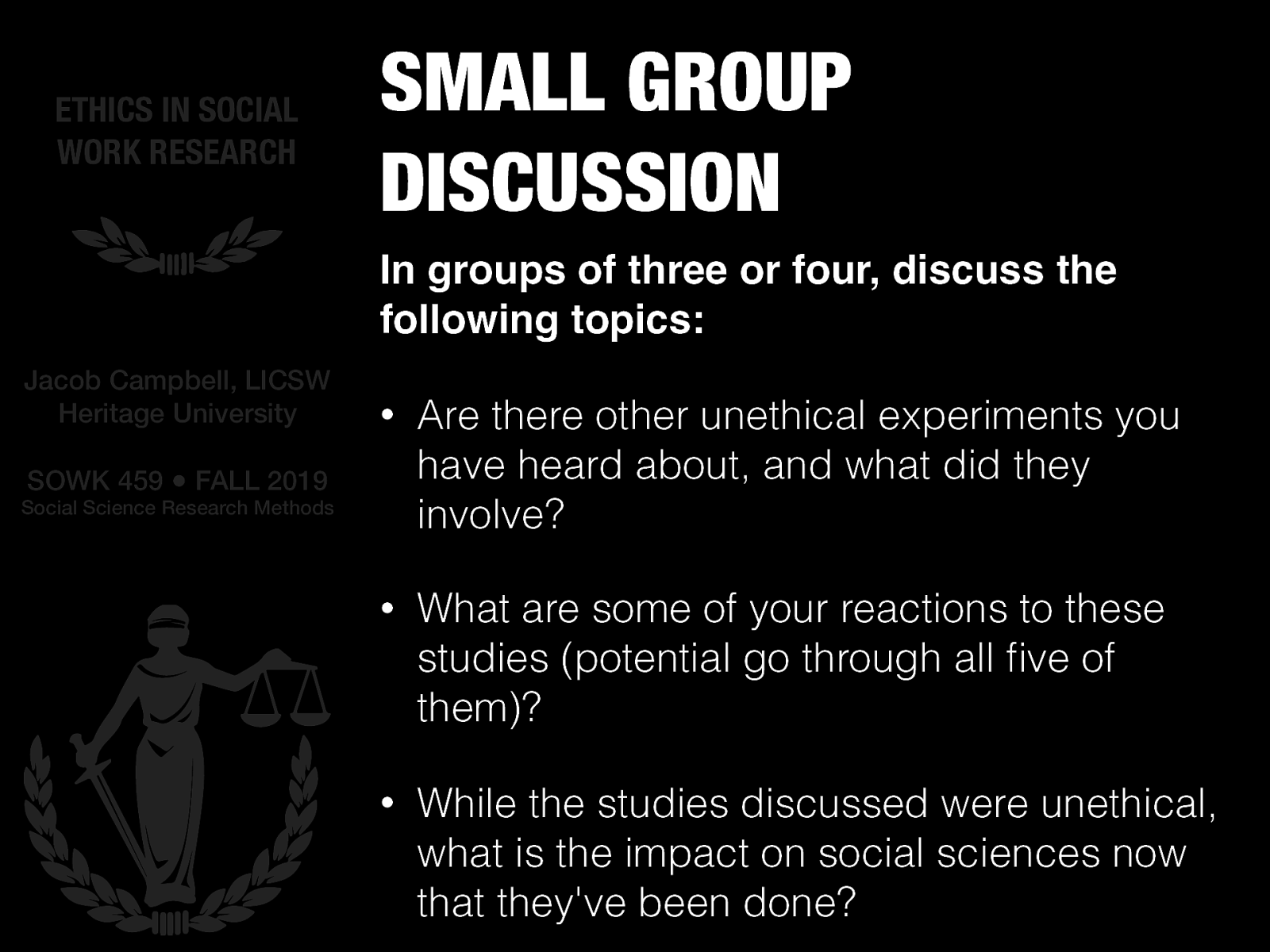
Small Group Discussion
General feedback about the video, if content they’ve known previously… etc.
[Small Group Activity] In groups of three or four, discuss the following topics:
- Are there other unethical experiments you have heard about, and what did they involve?
- What are some of your reactions to these studies (potential go through all five of them)?
- While the studies discussed were unethical, what is the impact on social sciences now that they’ve been done?

Types of IRBs (Institutional Review Boards)
These types of unethical behaviors are exactly why there are IRBs for doing scientific researech. There are three types of IRB:
- Exempt Review: lowest level of IRB review, for studies for studies with minimal risk or human subject involvement
- Expedited Review: middle level of IRB review, for studies with minimal risk but greater human subject involvement
- Full Board Review: highest level of IRB, for studies with greater than minimal risk to participants

Populations in Research: Protect and Serve
For both Social Workers in general, and as researchers we have a responsibility to our subjects.
One term that is specifically is discussed is that of vulnerable populations (groups of people who receive additional protection during IRB review).
[Whole Class Activity - Discussion] What populations are considered vulnerable populations? Why to we consider them vulnerable populations?
- Children
- Persons in prison
- Persons with developmental / cognitive disabilities… etc.
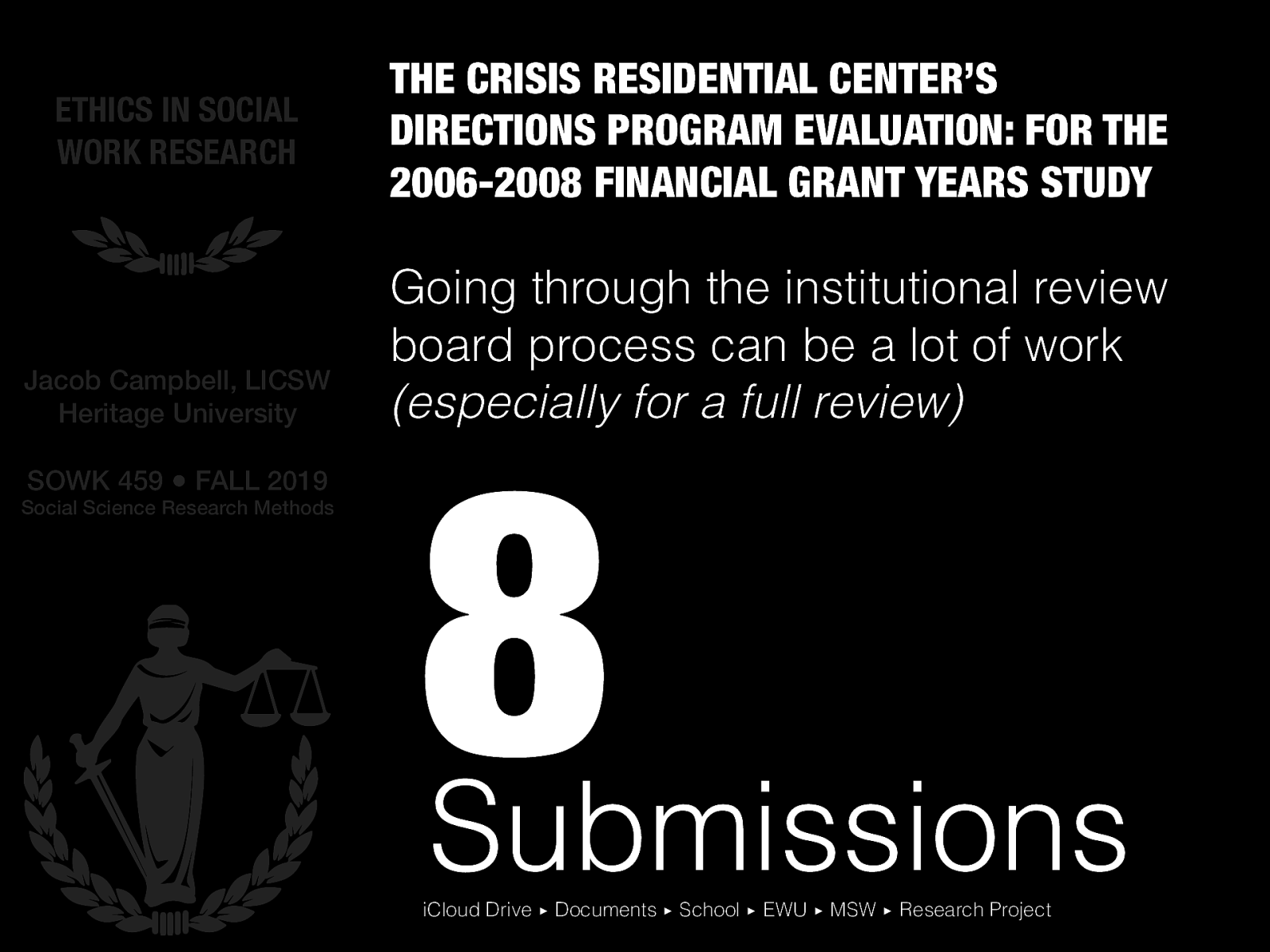
IRB Process Example: The Crisis Residential Center’s Directions Program Evaluation: For the 2006-2008 Financial Grant Years Study
Going through the institutional review board process can be a lot of work (especially for a full review)
- Overview of the research conducted
- Overview of the IRB process went through (preparing and submitting some forms, presenting to the board, making modifications, and receiving approval)
- Process can be very invovled…
Click -> 8 submissions
Side note, demo folder structure and keeping documents organized from classes and projects.
Demo: iCloud Drive ▸ Documents ▸ School ▸ EWU ▸ MSW ▸ Research Project
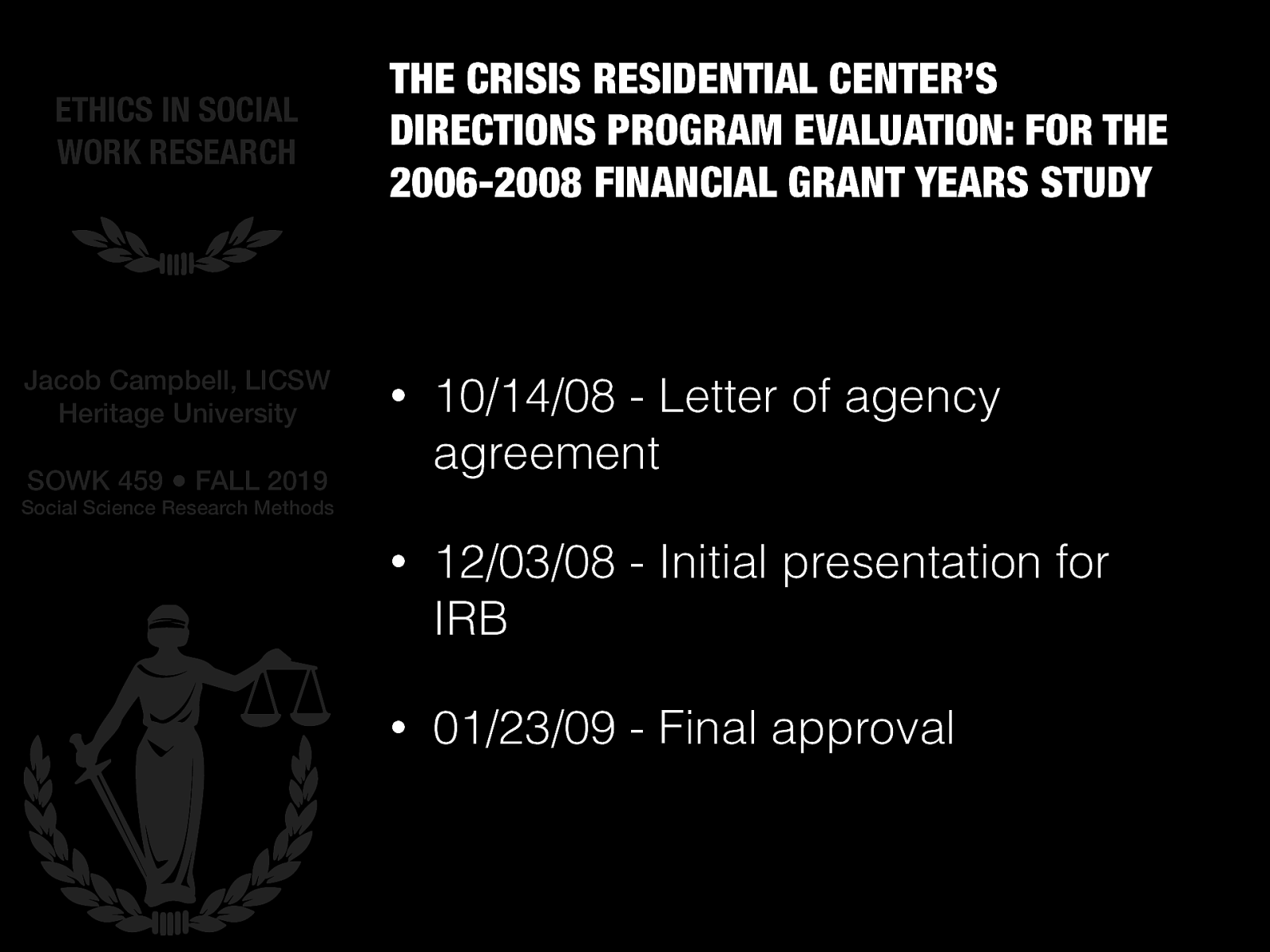
IRB Process Example: Timeline
The entire process took quite a bit of effort, but it was also over a long period of time.
- 10/14/08 - Letter of agency agreement
- 12/03/08 - Initial presentation for IRB
- 01/23/09 - Final approval

IRB Process Example: Documents Used (1 of 11)
I want to briefly show you what some of the documentation that I submitted in my project was.
Approval form from initial submission.

IRB Process Example: Documents Used (2 of 11)
Cover letter used

IRB Process Example: Documents Used (3 of 11)
Letter from agency where conducting research giving permission

IRB Process Example: Documents Used (4 of 11)
Page 1 of the application (protocals, human subject description, voluntary nature)

IRB Process Example: Documents Used (5 of 11)
Page 2 of the application (cont. voluntary nature, confidentiality)

IRB Process Example: Documents Used (6 of 11)
Page 3 of the application (cont. voluntary nature, risk / results)

IRB Process Example: Documents Used (7 of 11)
Page 4 of the application (cont. risk / results)

IRB Process Example: Documents Used (8 of 11)
Attachment A page 1 (background / rational of the activity, objectives of the research, specfic tasks of the subjects, how data will be used to address research question)

IRB Process Example: Documents Used (9 of 11)
Attachment A page 2 (other procedures that could be used)
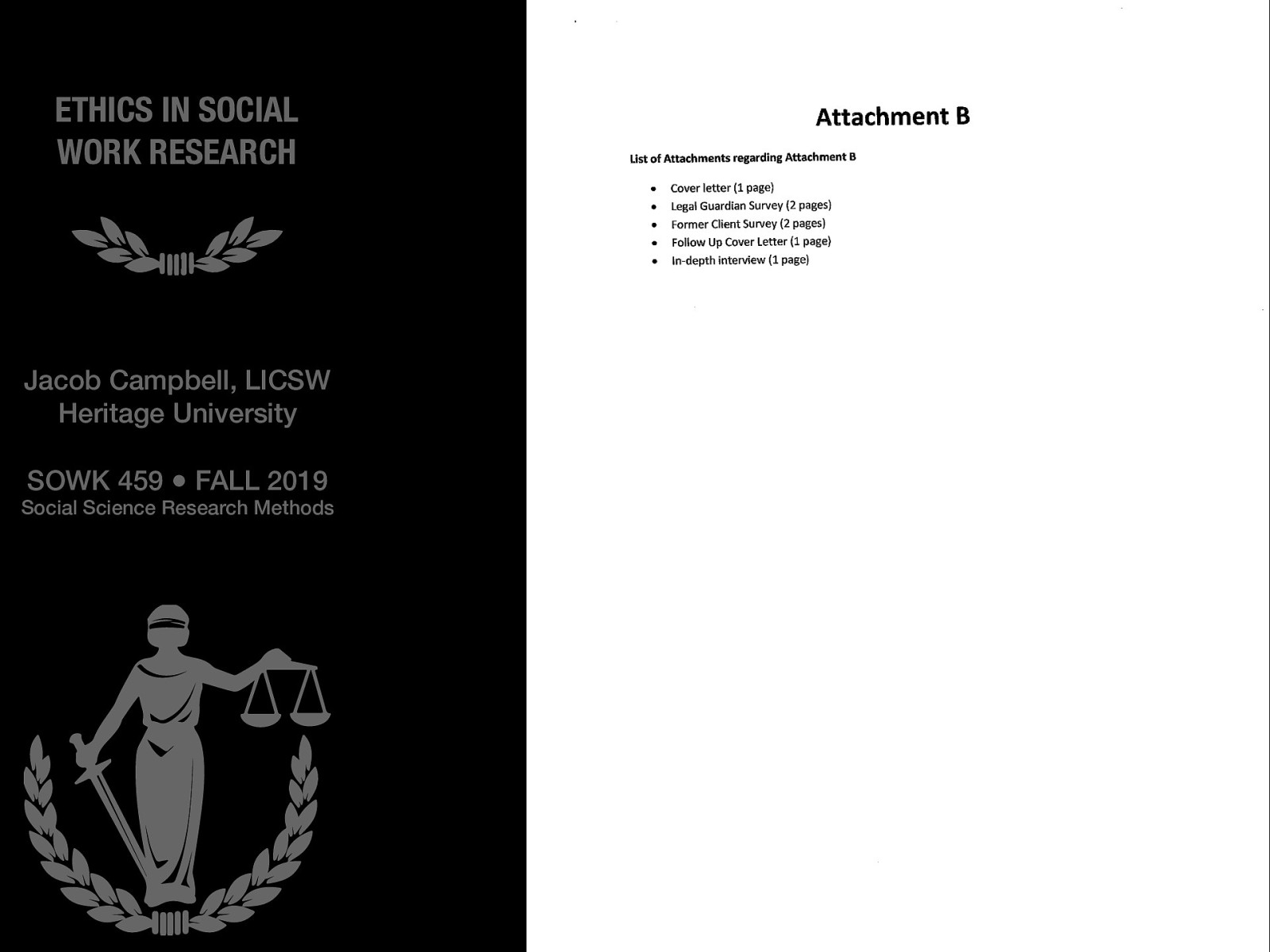
IRB Process Example: Documents Used (10 of 11)
Attachment B (various tools used in research study listing attachments… not shown on slide)
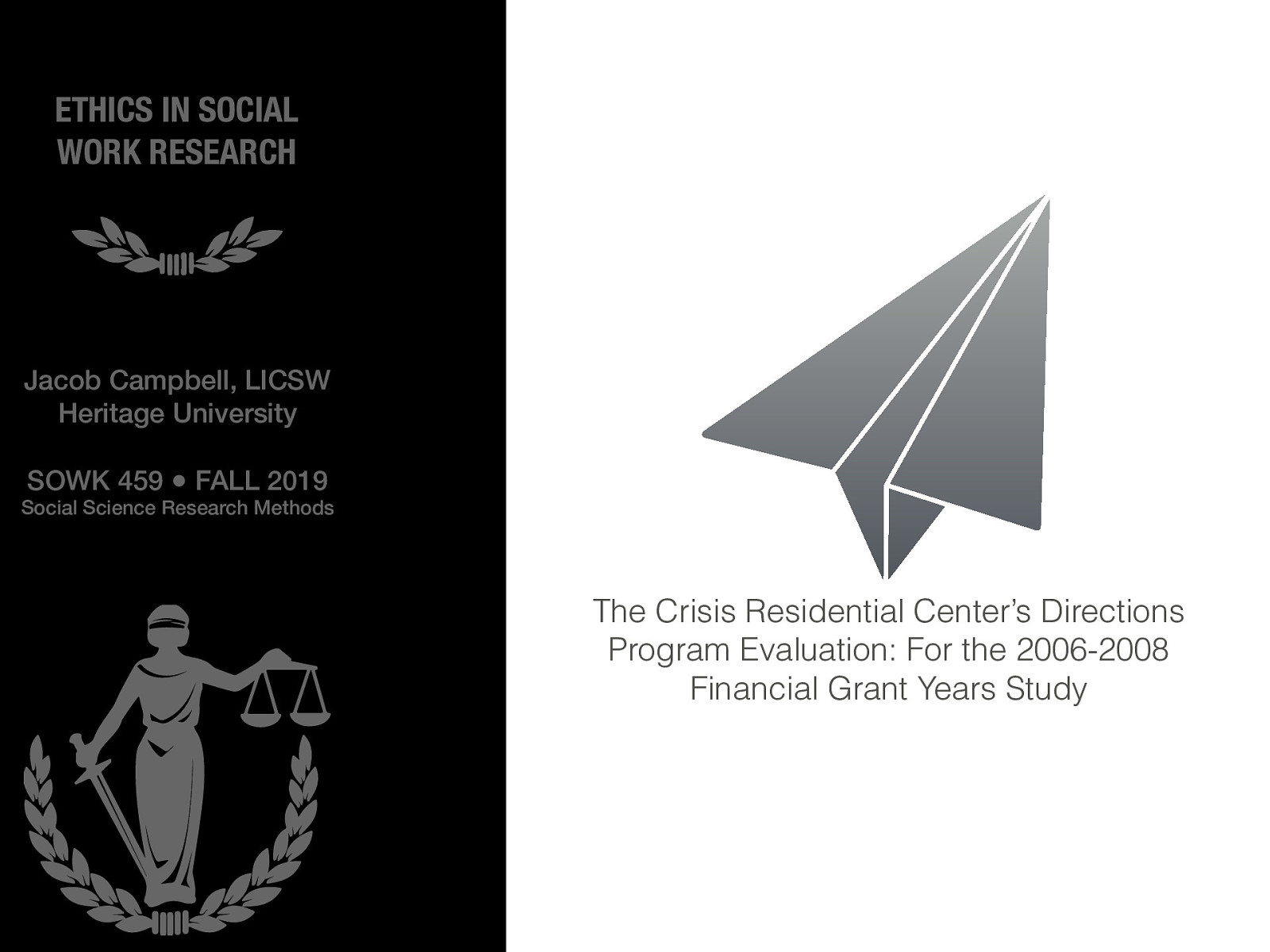
IRB Process Example: Documents Used (12 of 11)
Option of reading / reviewing the research completed.

IRB Call to Action
While all of that might seem a bit overwhelming and like a lot. Remember, that was a Full IRB Review. In thinking about your project for next semester if you are wanting to do conduct your project directly working with clients or a vulnerable population we would need to go through the IRB process (I believe). I would encourage some of you to consider this and starting thinking / working on it now.
Get a gold star!… ⭐️
What might the process of Institutional Review Board Look Like at Heritage and for your project?
- Consider would be less invovled
- I would support you in going through the process
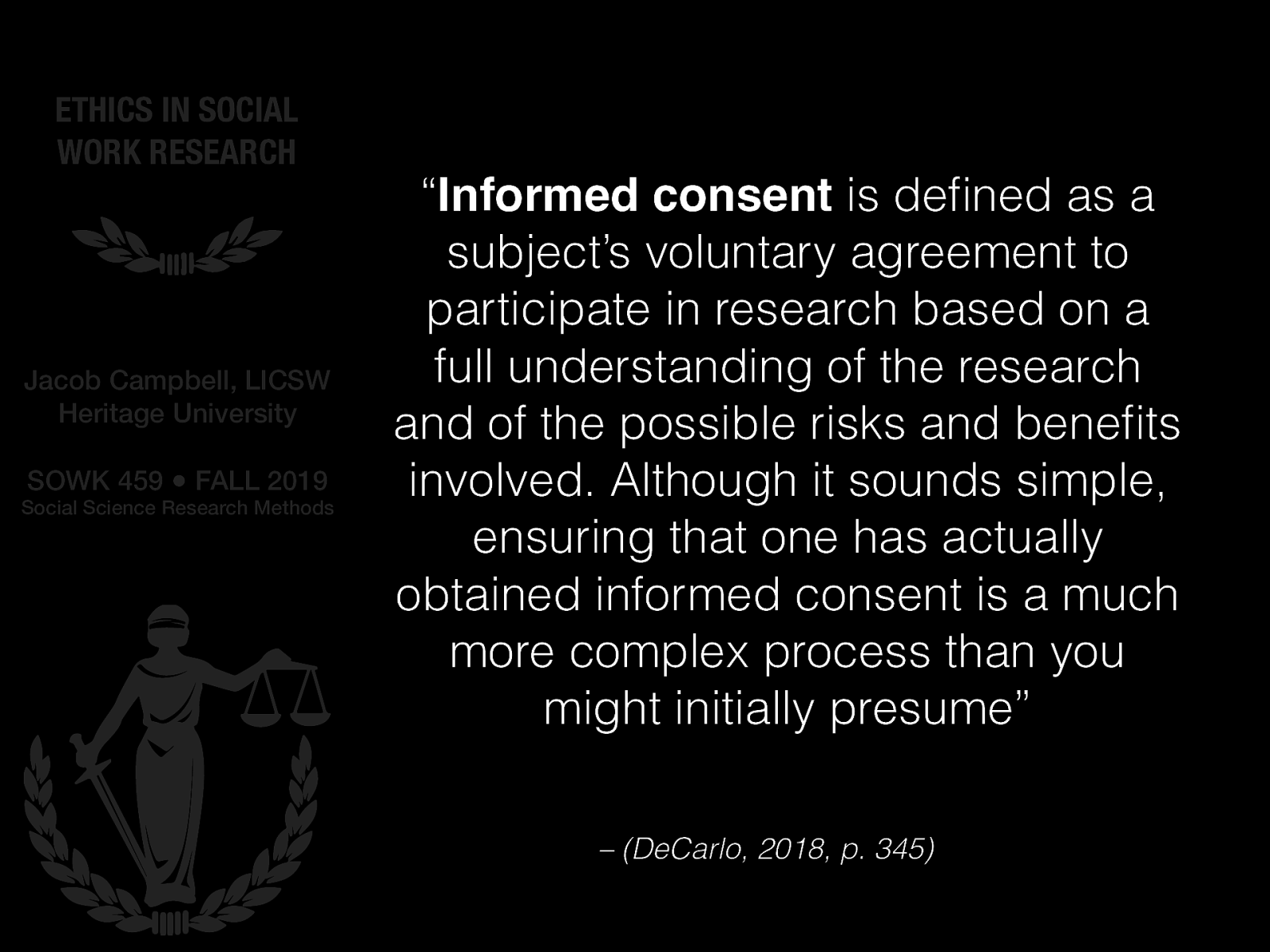
Informed Consent
An important activity related to the ethics of social science research is that of informed consent
DeCarlo (2018) states “Informed consent is defined as a subject’s voluntary agreement to participate in research based on a full understanding of the research and of the possible risks and benefits involved. Although it sounds simple, ensuring that one has actually obtained informed consent is a much more complex process than you might initially presume”
- What were some of the issues related to not obtaining informed consent described both in the video we watch and the readings?
- Why is this so important?
- In what ways can effect the research design?
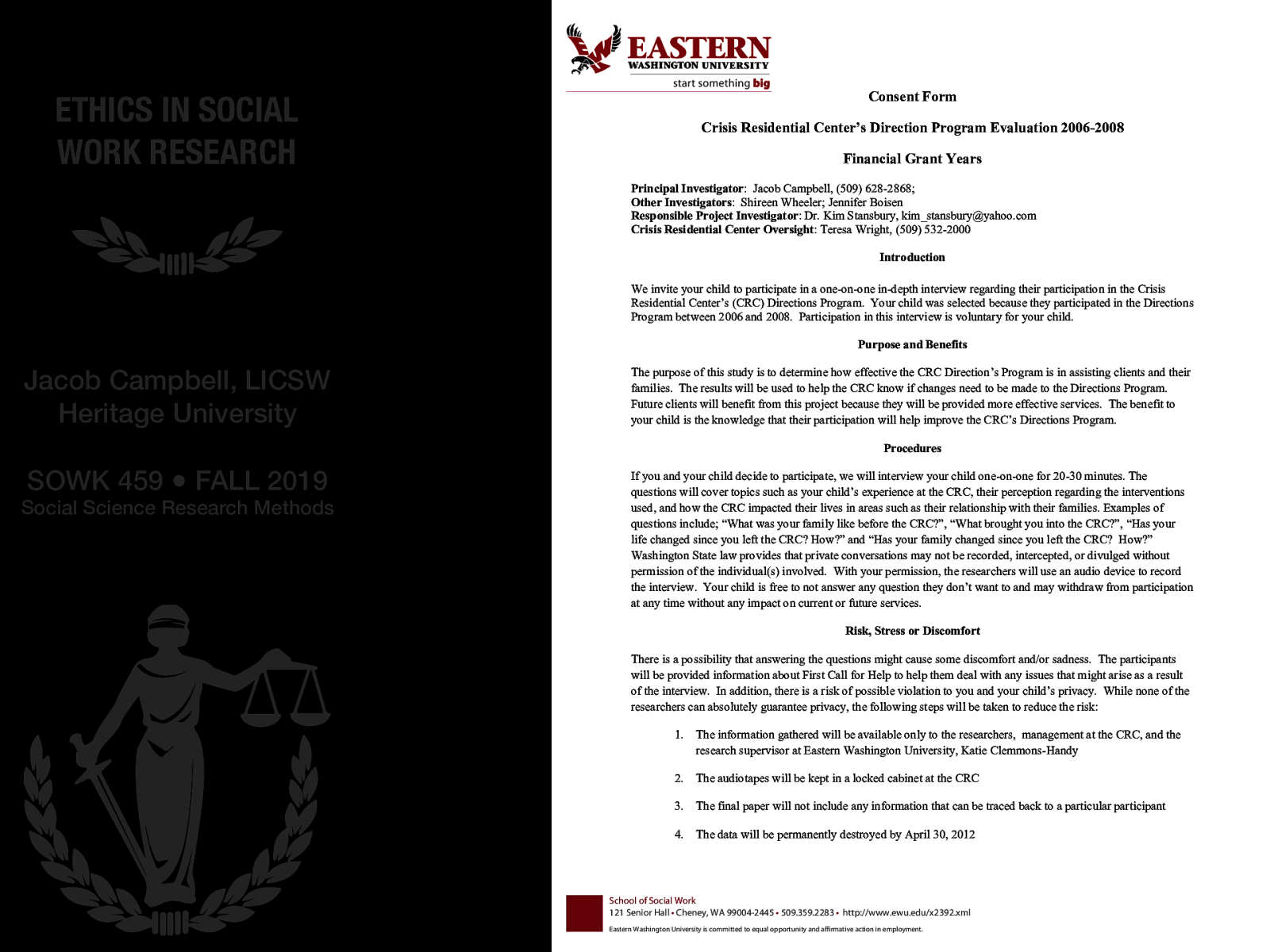
Example of Informed Consent (CRC Program Evaluation) (1 of 2)
Page one of the informed consent used. (Description, introduction, purpose, procedures, risk / stress / discomfort)
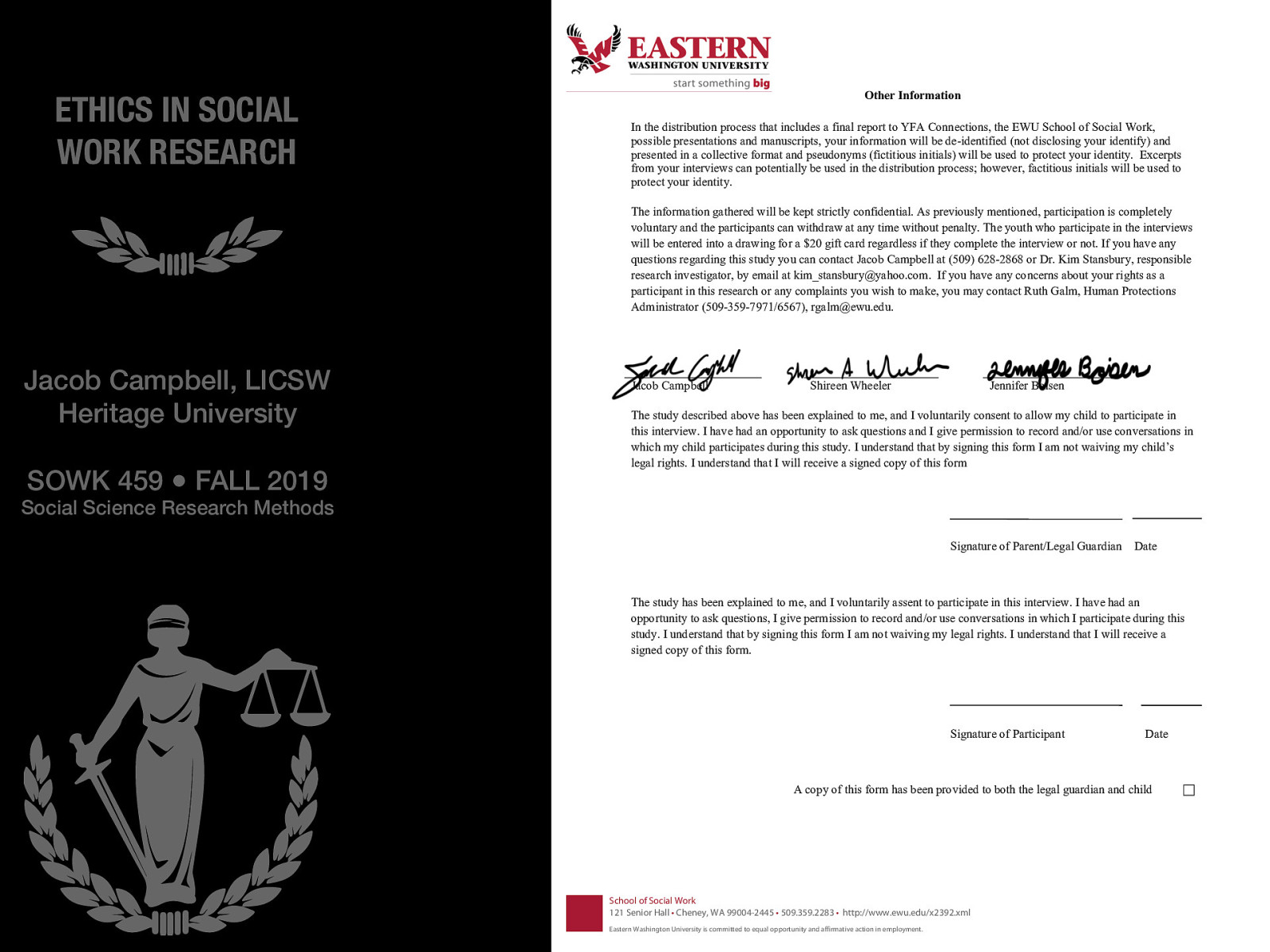
Example of Informed Consent (CRC Program Evaluation) (2 of 2)
Page two of the informed consent used. (Other information, signatures)
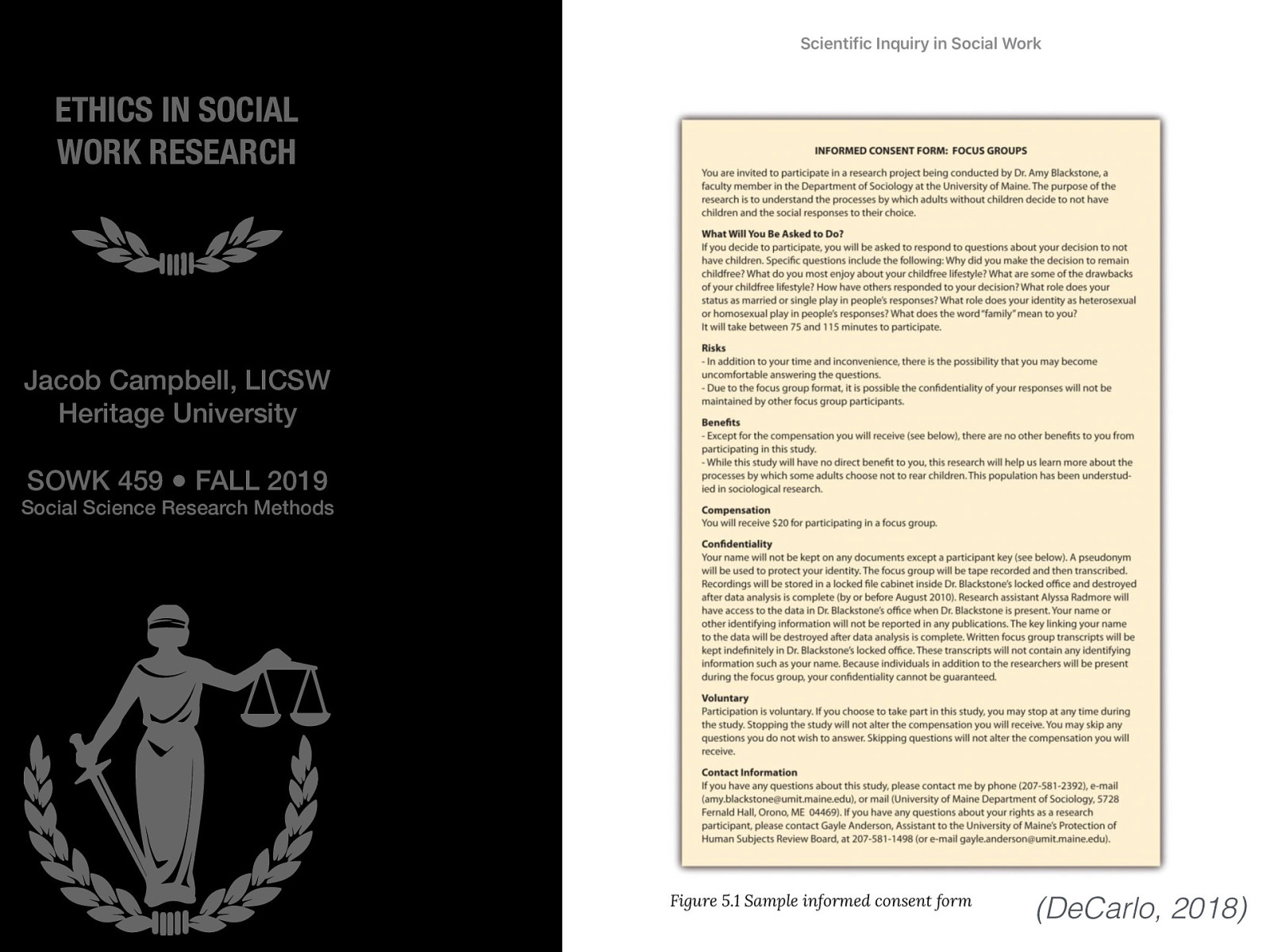
Example of Informed Consent (Book)
Example given in DeCarlo (2018) - What asked to do, risks, benefits, compensation, confidentiality, voluntary, contact info
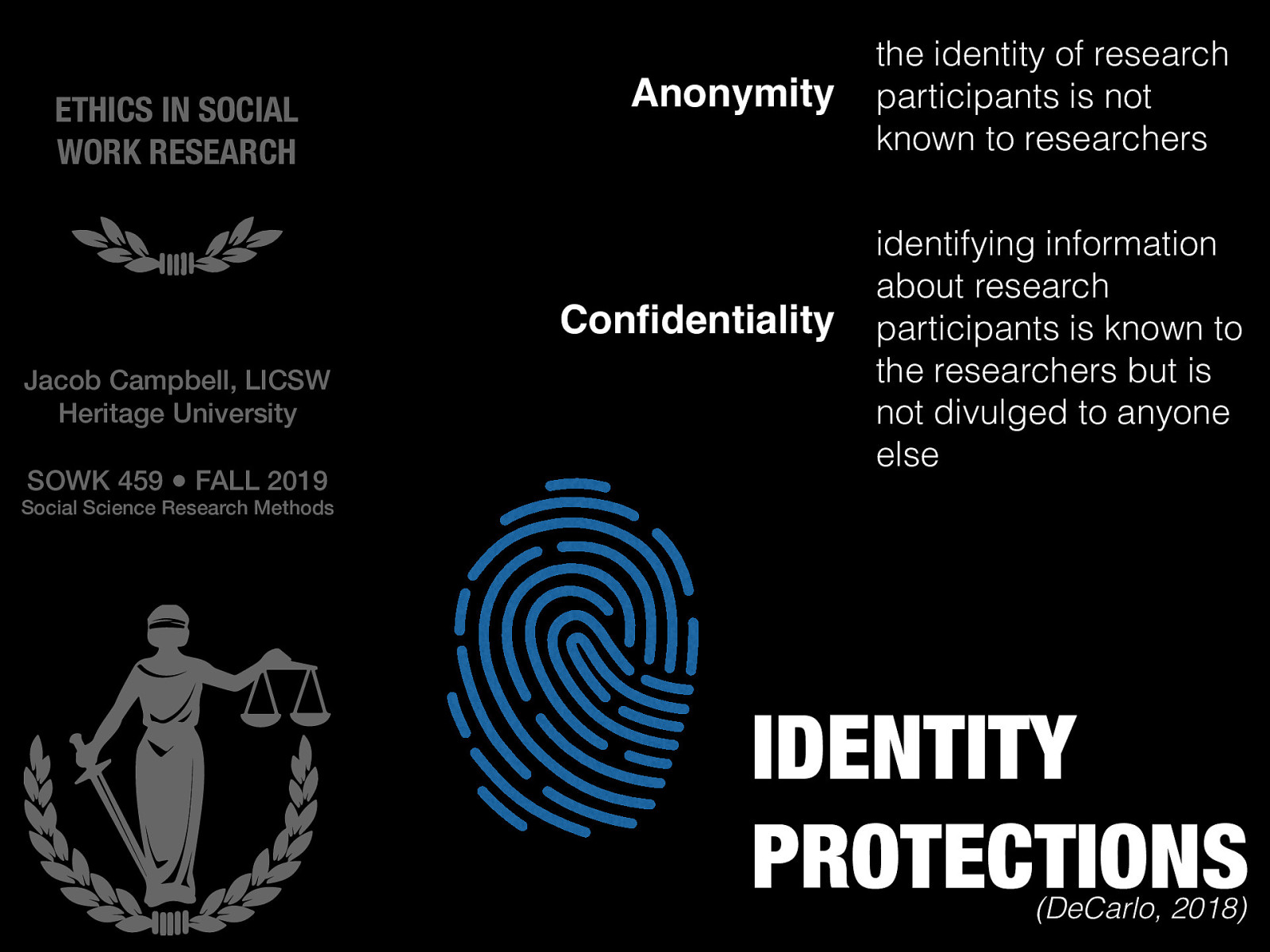
Identity Protections
DeCarlo (2018) describes that identity protection is another vital role of ethics in social science research methods.
This includes the terms:
- Anonymity: the identity of research participants is not known to researchers
- Confidentiality: identifying information about research participants is known to the researchers but is not divulged to anyone else
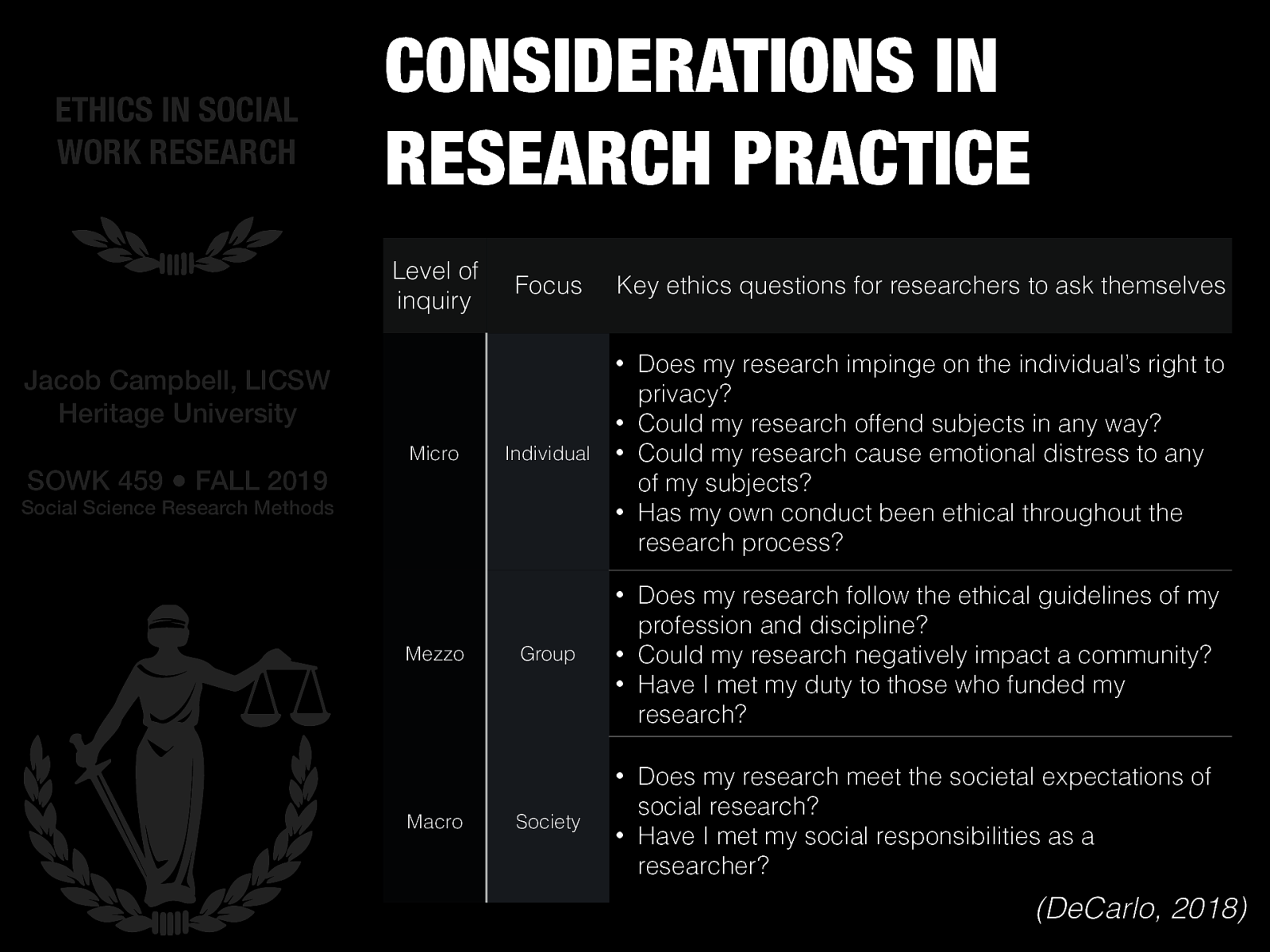
Considerations In Research Practice
Level of inquiry | Focus | Key ethics questions for researchers to ask themselves —- | —- | —- Micro | Individual | Does my research impinge on the individual’s right to privacy? Could my research offend subjects in any way? Could my research cause emotional distress to any of my subjects? Has my own conduct been ethical throughout the research process? Mezzo | Group | Does my research follow the ethical guidelines of my profession and discipline? Could my research negatively impact a community? Have I met my duty to those who funded my research? Macro | Society | Does my research meet the societal expectations of social research? Have I met my social responsibilities as a researcher?
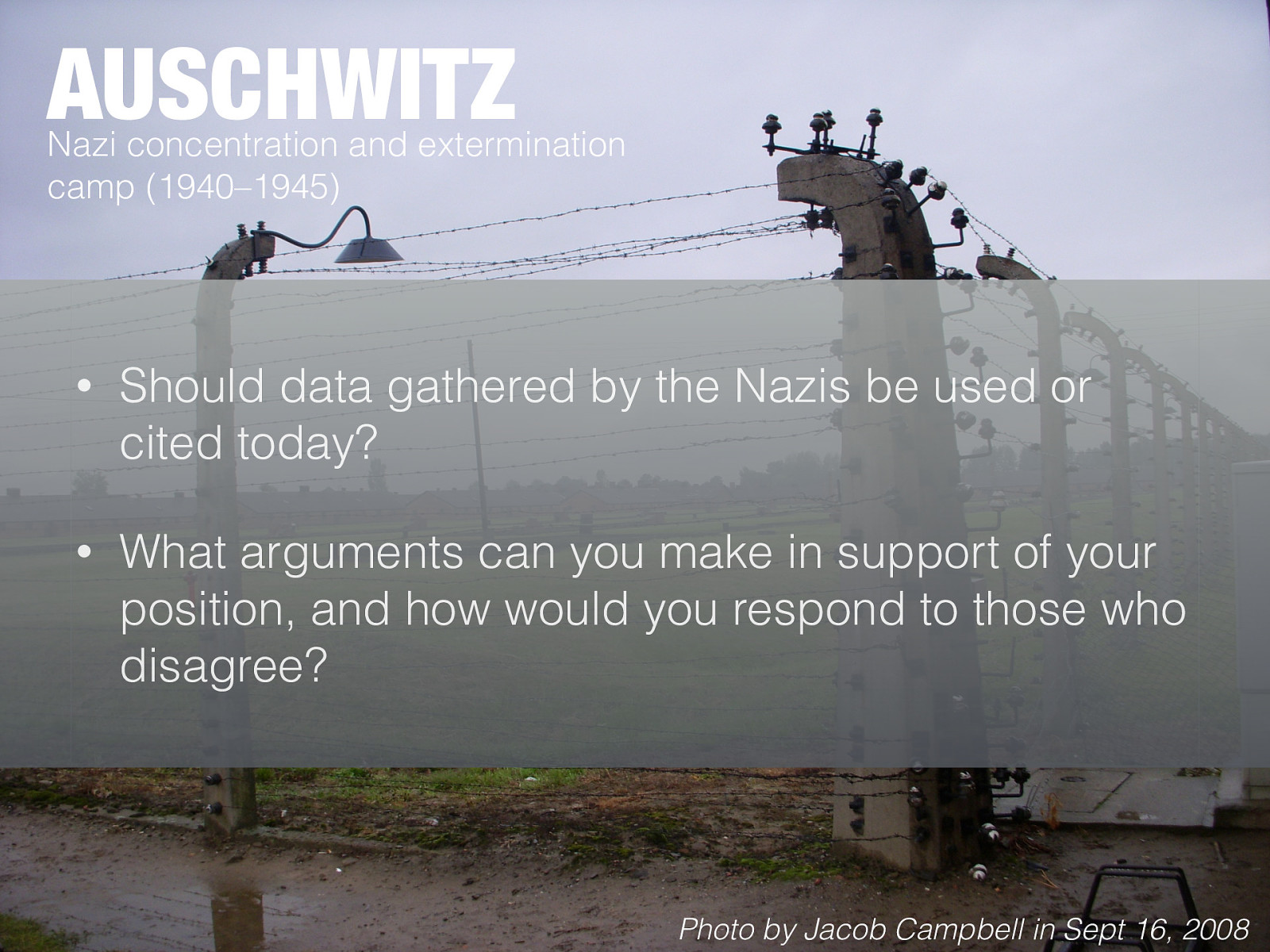
Auschwitz
Nazi concentration and extermination camp (1940–1945)
- Story has about my visit to Auschwitz (and projects in Chicago)
[Whole Class Activity - Discussion] What are some of what you know about medical experiments done by Nazis
DeCarlo (2018) discusses the differences between scholars and decision to have the Nazi work published and cited by scholars. He poses the following questions:
- Should data gathered by the Nazis be used or cited today?
- What arguments can you make in support of your position, and how would you respond to those who disagree?
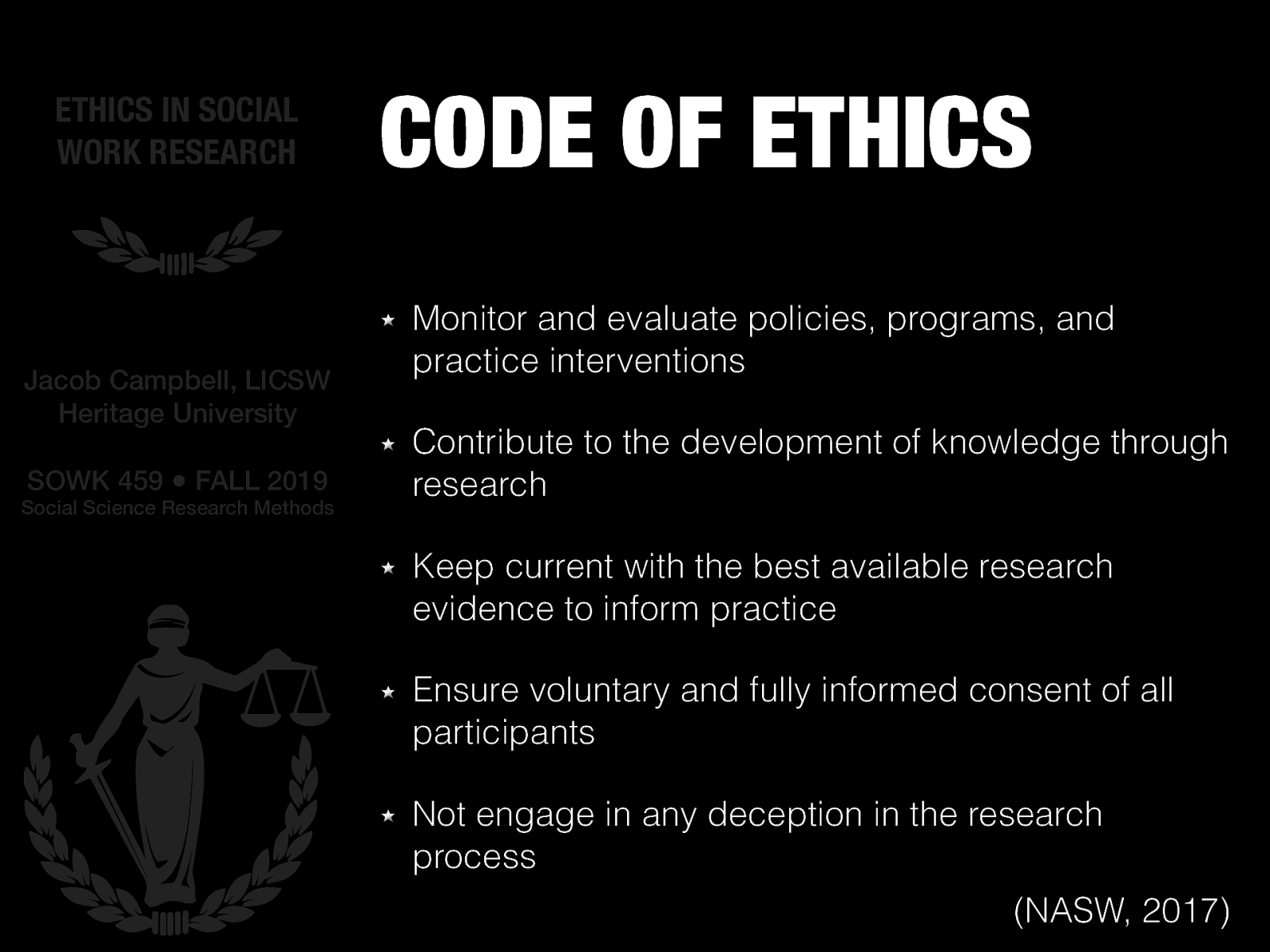
Code of Ethics (1 of 2)
From the NASW (2017) code of ethics… section 5.02
[Whole Class Activity] Discuss point by point each topic and what that might mean and the considerations.
- Monitor and evaluate policies, programs, and practice interventions
- Contribute to the development of knowledge through research
- Keep current with the best available research evidence to inform practice
- Ensure voluntary and fully informed consent of all participants
- Not engage in any deception in the research process
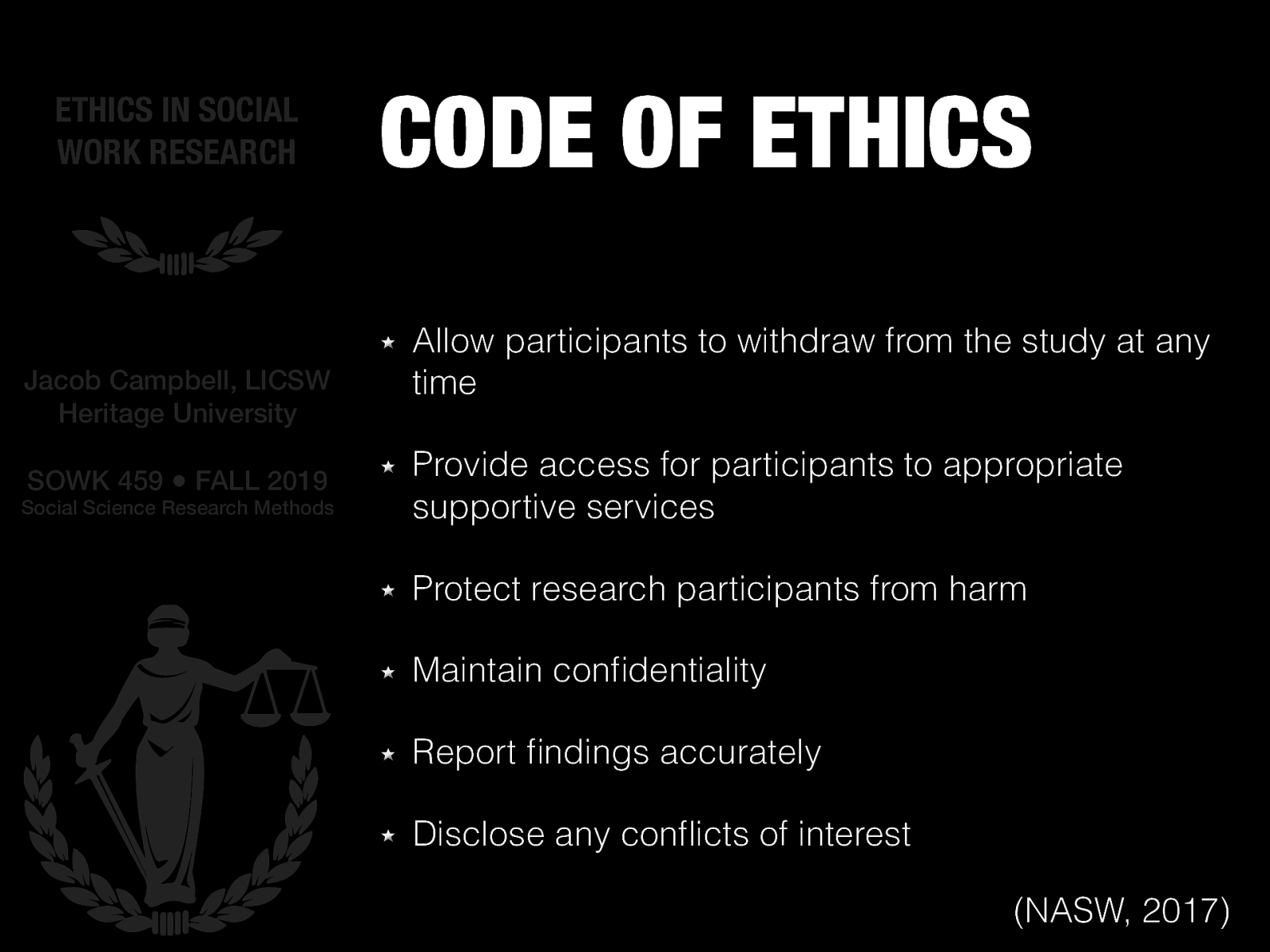
Code of Ethics (1 of 2)
- Allow participants to withdraw from the study at any time
- Provide access for participants to appropriate supportive services
- Protect research participants from harm
- Maintain confidentiality
- Report findings accurately
- Disclose any conflicts of interest
A look into the role ethics play in social science research. The agenda is as follows:
- Preparing for peer review process
- Unethical examples
- Tasks and concepts related to ethical social science research methods
- Examples of processes and forms related to ethics
